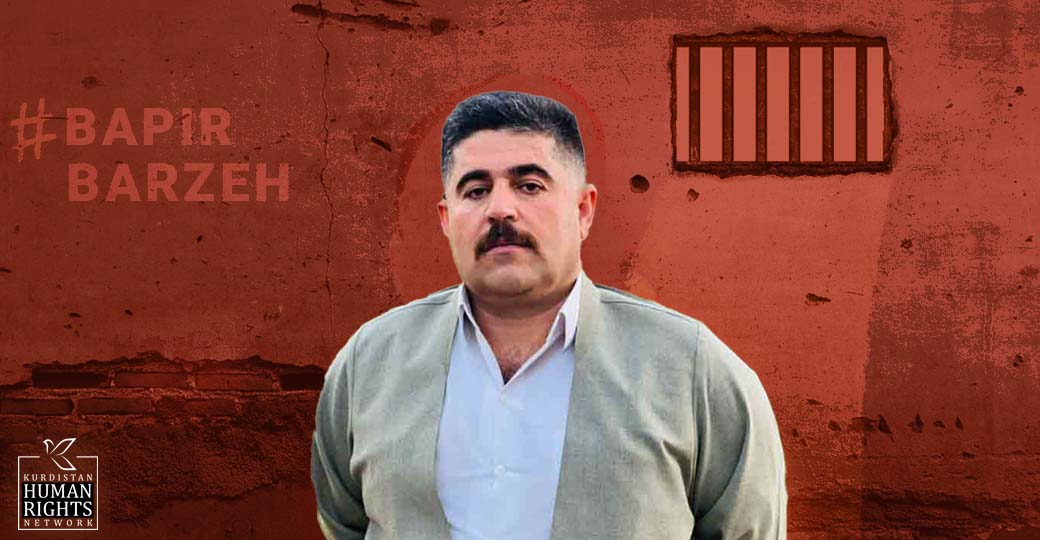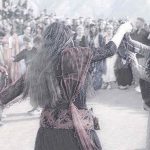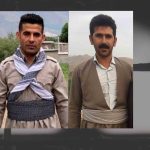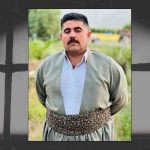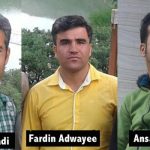Bapir Barzeh has been repeatedly arrested in recent years due to his political activities.
In 2020, he was sentenced to two and a half years of imprisonment on charges of “membership in groups opposed to the state,” and in October 2021, after serving one year, he was conditionally released from Naqadeh Prison in West Azerbaijan Province.
Arrest
Barzeh was arrested by the Ministry of Intelligence forces on 22 November 2022, during the anti-government Women, Life, Freedom uprising on the road near the village of Pasveh in Piranshahr, West Azerbaijan Province, and taken to the Ministry’s detention centre in Orumiyeh, West Azerbaijan Province.
On 26 January 2023, he was provisionally released from Naqadeh Prison on bail.
During his detention, he was denied the right to family visits and to have access to legal counsel.
Judicial Process
In May 2023, Branch 102 of the Criminal Court of Piranshahr, presided over by Judge Reza Ghahremani Saatlou, sentenced him to one year of imprisonment for “disrupting public order and peace” by participating in riots, disturbances, and actions in line with the objectives of groups opposed to the state.
In June 2023, Branch One of the Islamic Revolutionary Court of Mahabad, West Azerbaijan Province, presided over by Judge Amir Ojaghlou, sentenced him to an additional three years of imprisonment on charges of “acting against national security” through membership of the Democratic Party of Iranian Kurdistan (PDKI).
Current Status
On 13 January 2024, Barzeh was arrested and sent to Naqadeh Prison to serve his sentence after being summoned by Branch One of the Public and Revolutionary Prosecutor’s Office in Piranshahr.
Notes:
1. Women, Life, Freedom Uprising: Jina Amini (Mahsa Amini), a 21-year-old Kurdish woman from Saqqez, Kurdistan Province, was arrested on a street in Tehran on 13 September 2022 by the morality police because of the way she was dressed. Shortly after her arrest, she was transferred to Kasra Hospital in Tehran with head injuries and symptoms of brain death, and passed away three days later on 16 September 2022. The government’s killing of Jina sparked unprecedented anti-government protests, which began with a large turnout at her funeral at Aichi Cemetery in Saqqez and quickly spread to many cities across Iran. These widespread protests against the Islamic Republic of Iran, which lasted for several months, resulted in at least 527 protesters being killed and thousands injured and arrested. The protests are known for their central slogan of “Women, Life, Freedom” (Kurdish: Jin, Jiyan, Azadi).
2. Article 618 of the Islamic Penal Code: “Anyone who, through uproar, commotion, unconventional behaviour, or harassment of individuals, disrupts public order and peace or prevents people from engaging in their work, shall be sentenced to imprisonment for a period of three months to one year and up to 74 lashes.”
3. The Democratic Party of Iranian Kurdistan (PDKI) was founded on 16 August 1945, with the aim of gaining autonomy for Iranian Kurdistan. According to the party’s charter, this political organisation, grounded in the “nationalist ideas and organizational structure of the Society for Kurdish Resurrection (KJK) and with a realistic and contemporary approach”, emerged as a modern entity in the political arena. KJK was the founder of the Republic of Kurdistan (22 January 1946 – 15 December 1946) in Mahabad. The republic lasted only 11 months, ending with an attack by the Iranian army, which executed its leaders, including Qazi Muhammad, the party leader and President of Kurdistan.
PDKI went through a period of armed struggle in the late 1960s, marked by internal party disputes, and ultimately, re-emerged as a political party on the eve of the 1979 revolution. Two of its leaders, Abdul Rahman Ghassemlou and Sadegh Sharafkandi, were assassinated by the Islamic Republic of Iran in Europe in 1989 and 1992, respectively. In 2006, due to heightened internal conflicts, the party split into two factions: the Democratic Party of Iranian Kurdistan and the Kurdistan Democratic Party (HDK). These two factions eventually announced their reunification on 22 August 2022, after 15 years of separation.
The party has declared its ultimate goal as “the establishment of a democratic-socialist society” and its strategic slogan as “securing the rights of the Kurdish people in Iranian Kurdistan within the framework of a federal democratic system in Iran”. The main headquarters of the PDKI is in Erbil, Kurdistan Region of Iraq.

